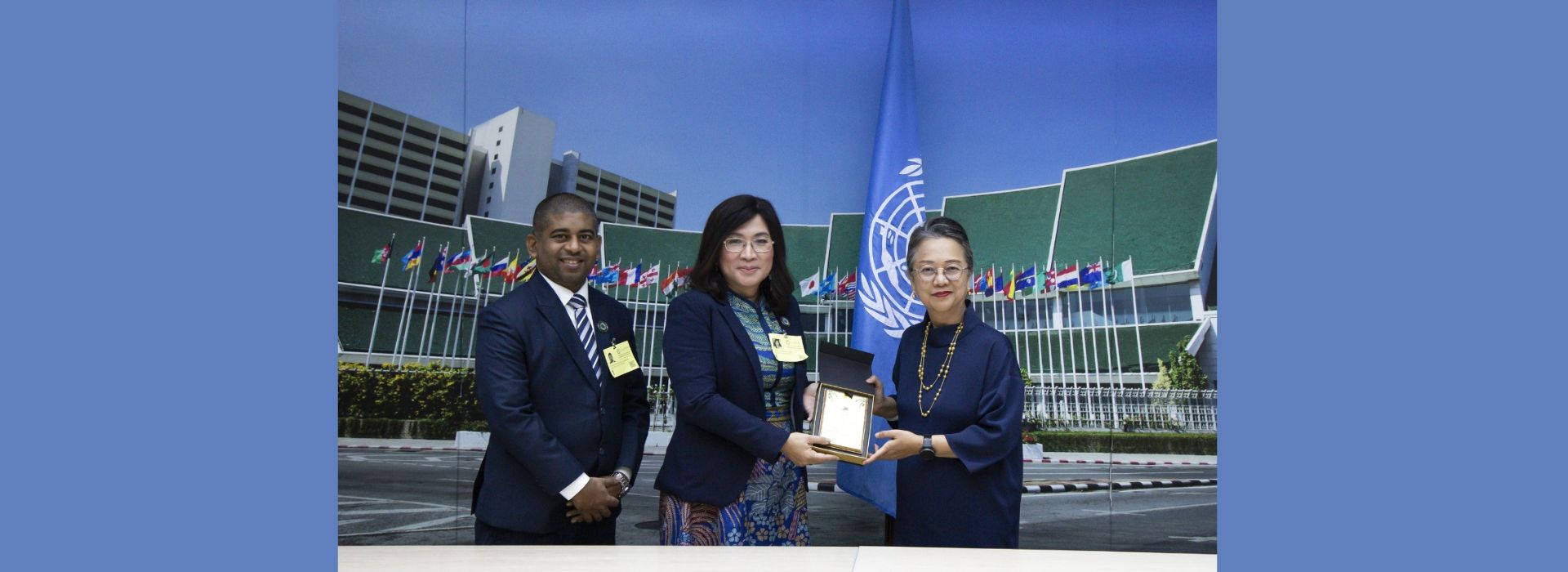The International Coconut Community (ICC) actively participated in the 12th Asia Pacific Forum on Sustainable Development (APSDF), hosted by the United Nations Economic and Social Commission for Asia and the Pacific (UNESCAP) at the UN Conference Center in Bangkok. ICC Director General Dr. Jelfina C. Alouw and Deputy Director General Mr. A.H.N. Chinthaka represented ICC at the forum, highlighting the coconut sector’s potential in addressing global sustainability challenges.
12th Asia Pacific Sustainable Development Forum: Key Discussions
The APSDF serves as a premier regional platform that brings together governments, international organizations, civil society, and private sector representatives to accelerate progress on the 2030 Sustainable Development Goals (SDGs). The 2025 forum focused on targeted, evidence-based solutions to food security, renewable energy, climate resilience, and economic sustainability—all of which align closely with ICC’s mission.
During the discussions, ICC emphasized the vital role of the coconut industry in advancing sustainable agriculture, supporting smallholder farmers, and developing climate-smart innovations such as biofuel production and carbon sequestration initiatives. ICC also engaged with key stakeholders to explore potential collaborations for promoting sustainable coconut-based industries in the region.

Courtesy Meeting with UNESCAP Executive Secretary
On the sidelines of the forum, ICC’s delegation had a courtesy bilateral meeting with H.E. Dr. Armida Salsiah Alisjahbana, Under-Secretary-General of the United Nations and Executive Secretary of UNESCAP. During the discussion, Dr. Jelfina presented the theme “Collaborating for Impact: ICC’s Role in the Future of the Coconut Industry,” outlining ICC’s key programs and strategies that contribute to global sustainability efforts. She emphasized the pressing challenges faced by the coconut industry, particularly the shortage of raw materials, rising global demand for coconut based products, and intense competition with powerful buyers that drive up prices and limit marker access for smaller producers.

Dr Jelfina also underscored ICC’s initiatives, including biofuel development—particularly the Sustainable Aviation Fuel (SAF) derived from non-standard coconut—and market trendsfor coconut products. Special attention was given to ICC’s Youth Empowerment Program, which provides training, internships, and entrepreneurship opportunities to young professionals in the coconut industry, as well as other capacity-building initiatives, including the Coconut Genetic Resources Network (COGENT), international training courses, and market development programs. Dr. Armida commended ICC’s contributions and underscored the importance of further integrating the coconut sector into regional sustainability frameworks. ICC delegation also discussed trade barriers for the coconut sector and how UNESCAP can support overcoming this using research solutions.
ICC’s Proposal for a Side Event at a Future UNESCAP Meeting
A key outcome of the meeting was ICC’s proposal to organize a side event at an upcoming UNESCAP meeting to further highlight the coconut sector’s contributions to regional and global sustainability efforts. The proposed side event, titled “Harnessing the Potential of Coconut for Food and Energy Security: Sustainable Solutions for a Resilient Future,” will focus on:
• The role of coconut in enhancing food security and nutrition.
• Coconut-based renewable energy solutions, including biofuels.
• Climate resilience and sustainable agricultural practices.
• Policy recommendations for strengthening the coconut sector’s role in global development.
Dr. Armida welcomed this initiative and encouraged ICC to submit a formal proposal in collaboration with its member countries. She emphasized that such a discussion would be valuable for policymakers, industry leaders, and development partners, further integrating the coconut industry into regional sustainability frameworks.
Outcome and Next Steps
Following the meeting, ICC will work closely with its member countries to develop a comprehensive proposal for the side event, aligning it with UNESCAP’s key priorities. The event will serve as a platform for knowledge exchange, policy dialogue, and investment opportunities within the coconut industry.
ICC remains committed to advocating for the coconut sector as a driver of sustainable development, ensuring that it continues to contribute to global food systems, energy solutions, and climate resilience strategies.


